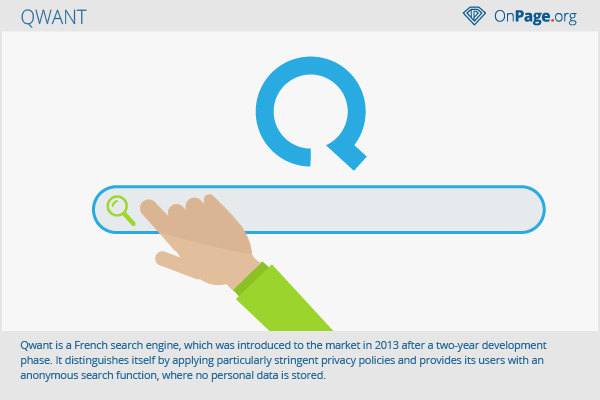Qwant
Qwant is a French search engine, which was introduced to the market in 2013 after a two-year development phase. It distinguishes itself by applying particularly stringent privacy policies and provides its users with an anonymous search function, where no personal data is stored. Qwant is an alternative to Google, Bing, Yahoo, DuckDuckGo, Blekko or Ghostery.
General information
The search engine was founded by the two software developers Jean-Manuel Rozan and Éric Leandri in Paris in 2011. Background for this were the NSA and Prism scandals which brought the topics of privacy to the center of public attention.
In July 2013, the official version of Qwant was launched in France. The search engine is currently available in 15 languages and records revenue of about 5 million euros. The main sources of income are B2B and e-commerce, because Qwant does not want to display ads but generate profits through collaborations with other businesses.
According to the company, more than 8 million users visit the site every day and execute more than 500 million searches. Much of the traffic generated is from French users, about 65%. With its launch in Germany and other countries, Qwant was able to enter into a partnership with TripAdvisor and will also be delivered in the future as the default search engine in the mobile Firefox OS operating system. Currently, Qwant employs 25 employees and works together with the search specialists Pertimm on a separate index to compete with Google.
Functions
Qwant works similarly to other search engines and is technically still based on the search engine Bing from Microsoft. However, there are significant differences in the presentation of search results because Qwant displays them in pre-sorted lists entitled Web, News, Qnowledge Graph Social, and Shopping.
Different links will be shown depending on the region. It is also possible to search media, persons, and journals through the tabs at the top of Qwant’s homepage. Under the Journals tab additional categories such as leisure, society or humor can be searched. Through these segments Internet searches are made much easier, but also limited per se. Particularly interesting are the functions that relate to privacy. On Qwant’s homepage the current surfing session can be excluded from the Piwik web analytics, which the search engine uses. If you click this link, no statistical data will be recorded.
As soon as another PC or browser is used, this procedure must be performed again to remain anonymous. Important point of criticism is that user tracking is designed as an opt-out and is not prevented from the outset.
Relevance to SEO
The importance of search engines, which represent an alternative to Google, rises and falls with the number of users and market shares of these search engines. Qwant has daily over 8 million users, however, these are to a large extent from France. Accordingly, this search engine is of interest to websites that have or want to enter the French market. Nevertheless, an optimization for various search engines cannot hurt, especially if small, international market shares are important, after all, 40% of users are from other countries.
The aspect of data protection represents another hurdle to search engine optimization for Qwant, because no statistical data are available about visitor behavior. SEO’s have no information available with which to analyze and optimize websites specifically. For users, this aspect is an important advantage, however, because Qwant cannot establish correlations between IP addresses and searches.

